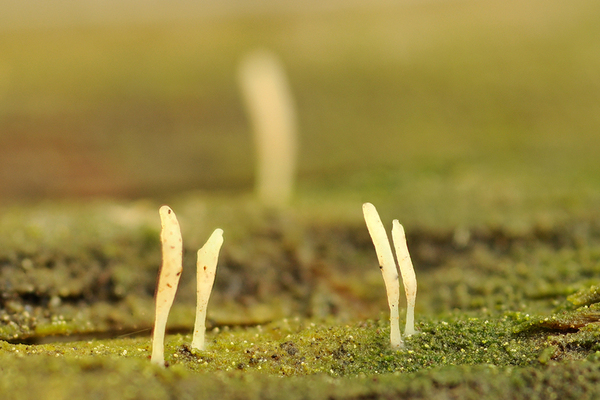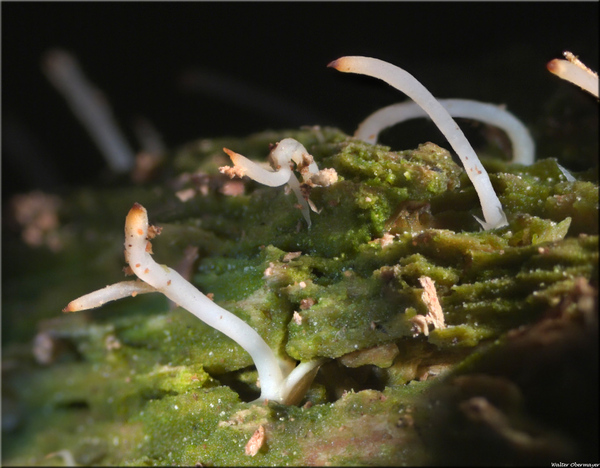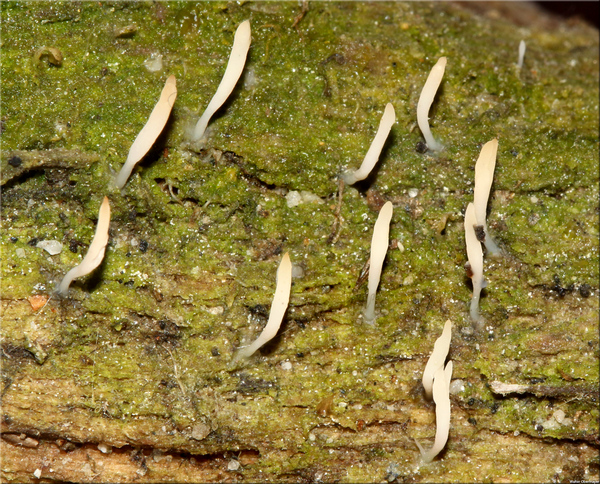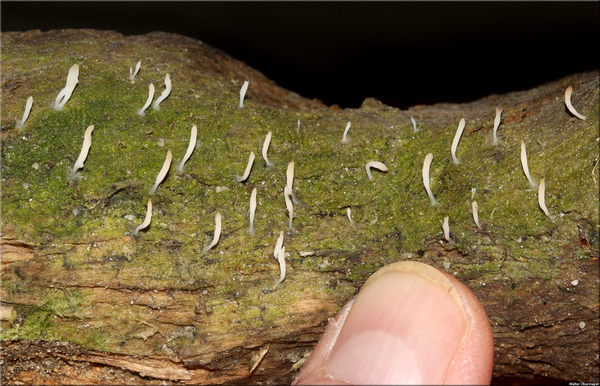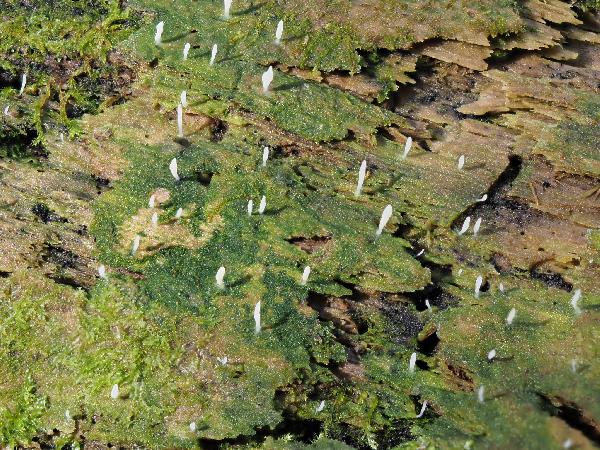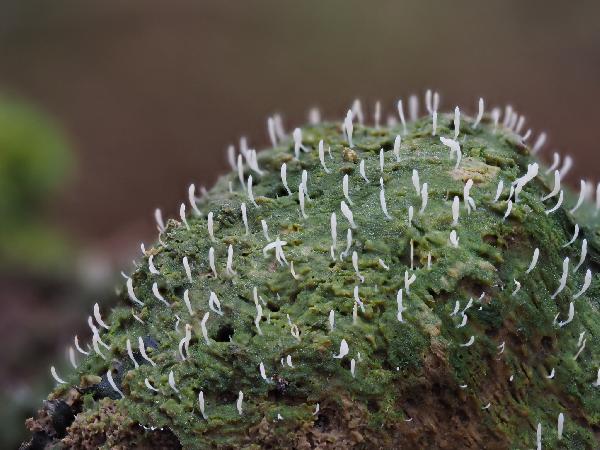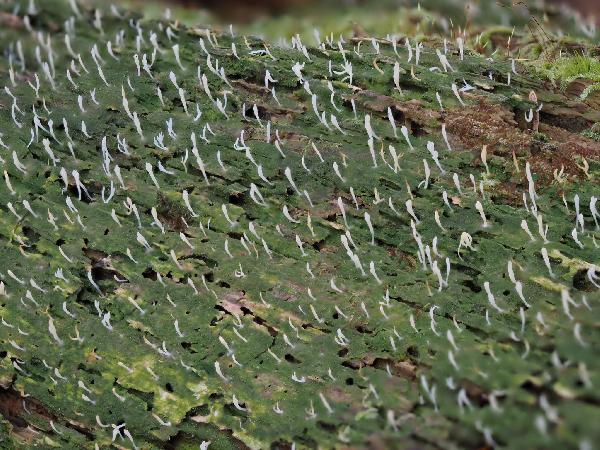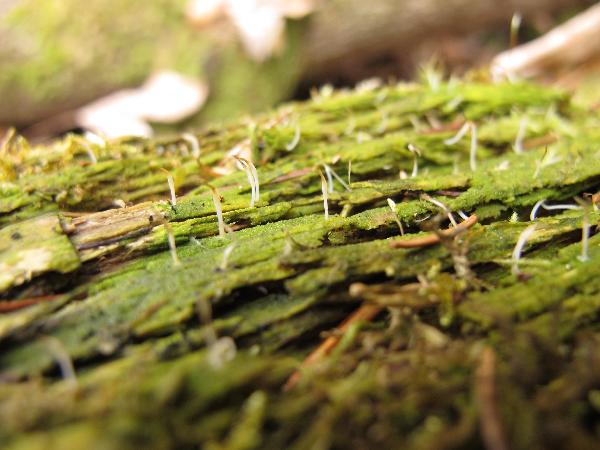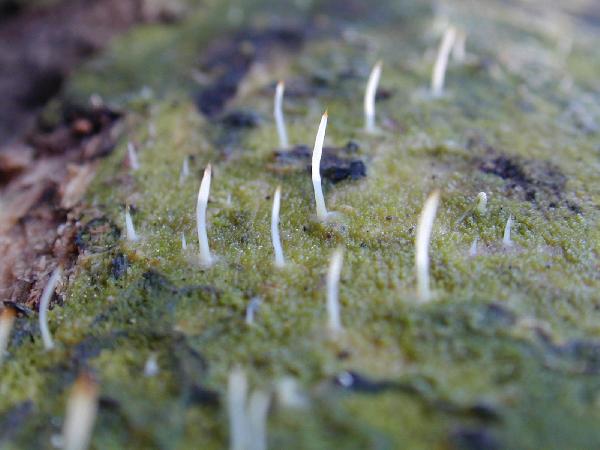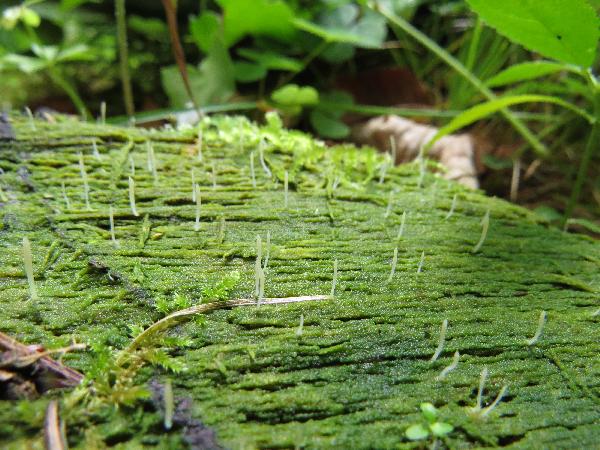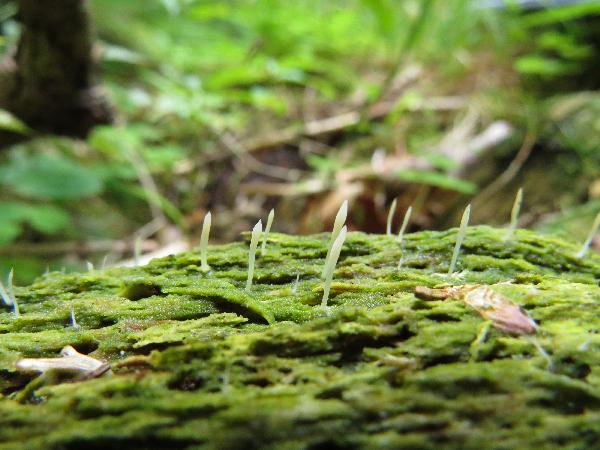Multiclavula mucida (Pers.) R.H. Petersen
Am. Midl. Nat., 77: 212, 1967. Basionym: Clavaria mucida Pers. - Comm. Fung. Clav.: 55, 1797.
Synonyms: Lentaria mucida (Pers.) Corner; Stichoclavaria mucida (Pers.) Paechn.
Distribution: N - Frl (Ravera & al. 2019b), Ven (Onofri & al. 2013), TAA (CLU 10971), Emil (Bernicchia & al. 1981, Fariselli & al. 2020).
Description: Thallus crustose, episubstratic, forming a soft, gelatinous (when wet), green to grey-green, 0.5-1 mm thick film made of minute granules consisting of clumps of algal cells incompletely surrounded by hyphae. Basidiocarps not lichenized, ephemeral (summer and autumn), cylindrical to club-shaped, 3-15(-20) mm tall, 0.2-0.5(-1) mm wide, creamy white, geotropically oriented, the apices pointed or slightly forked, the upper fertile part sometimes yellowish brown at maturity, the base slightly cottony, with a simple monomitic hyphal system, the hyphal septa with clamps, a dense subhymenium, and a thickening hymenium. Basidia clavate, with (4-)6 sterigmata. Basidiospores ellipsoid to slightly cylindrical, hyaline and smooth-walled, with (1-)2 oil droplets, (4.5-)5.5-6.5(-8) x 2-3.5 µm, I-. Photobiont chlorococcoid. Spot tests: all negative. Chemistry: thallus without lichen substances.Note: on decaying wood (logs, stumps) in pristine, humid montane forests; perhaps overlooked by lichenologists, but certainly very rare in Italy.
Growth form: Fruticose
Substrata: lignum
Photobiont: green algae other than Trentepohlia
Reproductive strategy: mainly sexual
Commonnes-rarity: (info)
Alpine belt: absent
Subalpine belt: absent
Oromediterranean belt: absent
Montane belt: extremely rare
Submediterranean belt: absent
Padanian area: absent
Humid submediterranean belt: absent
Humid mediterranean belt: absent
Dry mediterranean belt: absent
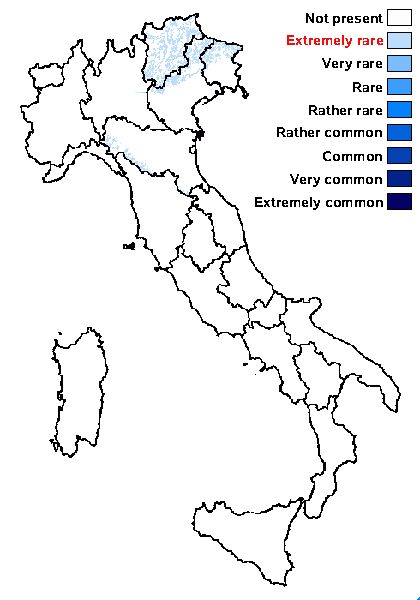
Predictive model
Herbarium samples
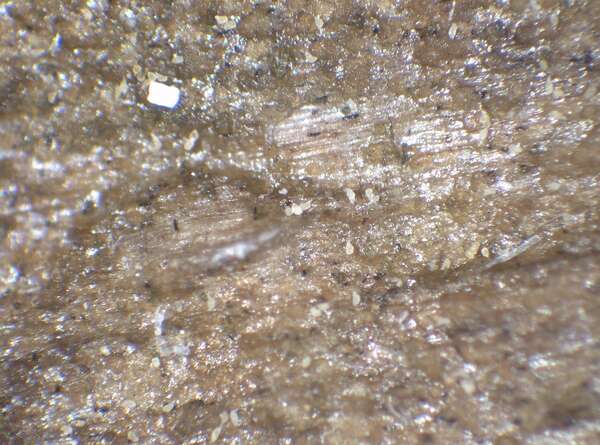

P.L. Nimis; Owner: Department of Life Sciences, University of Trieste
Herbarium: TSB (17058)
2003/03/05
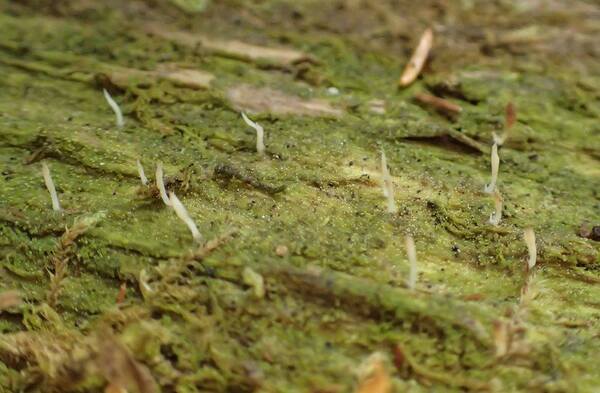

Curtis Randall Björk, - CC BY-SA 4.0
Sugarbowl-Grizzly Den Provincial Park, British Columbia, Canada
August 2017
as v. tilesii
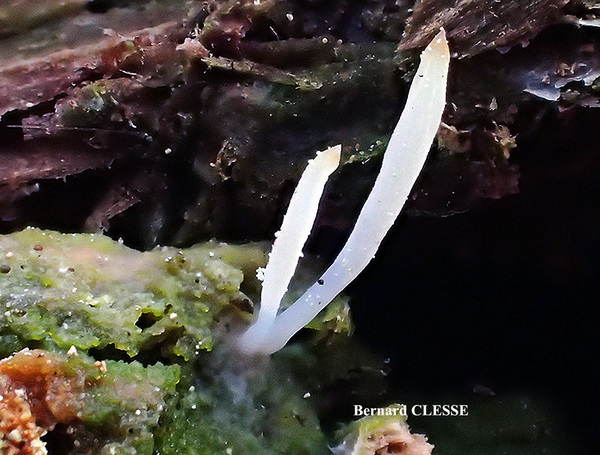
Bernard Clesse - Source: hhttp://www.lichensmaritimes.org/index.php?task=fiche&lichen=648&lang=en
France, Storckensohn
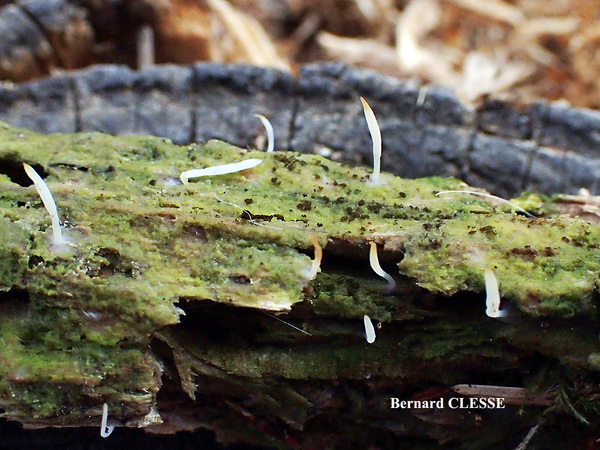
Bernard Clesse - Source: hhttp://www.lichensmaritimes.org/index.php?task=fiche&lichen=648&lang=en
France, Storckensohn
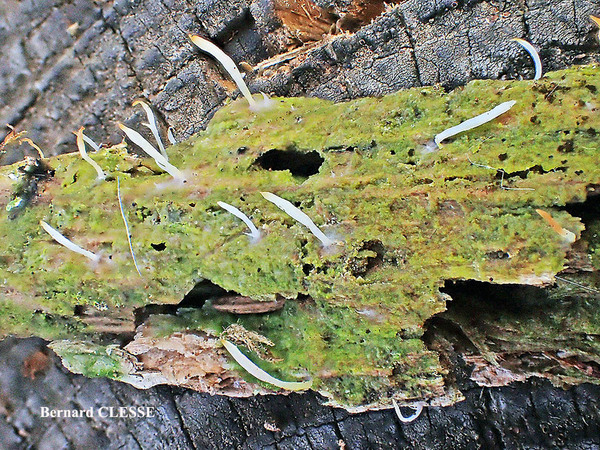
Bernard Clesse - Source: hhttp://www.lichensmaritimes.org/index.php?task=fiche&lichen=648&lang=en
France, Storckensohn
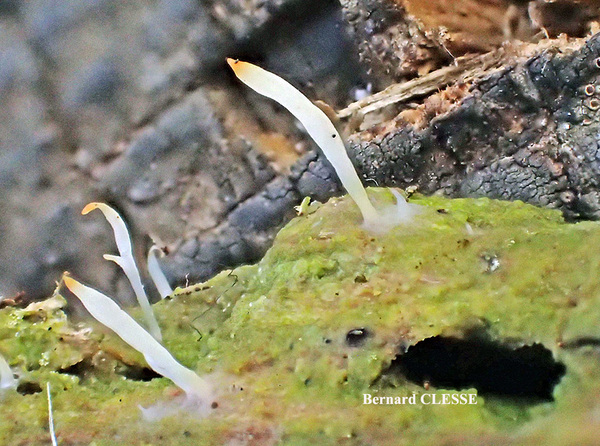
Bernard Clesse - Source: hhttp://www.lichensmaritimes.org/index.php?task=fiche&lichen=648&lang=en
France, Storckensohn
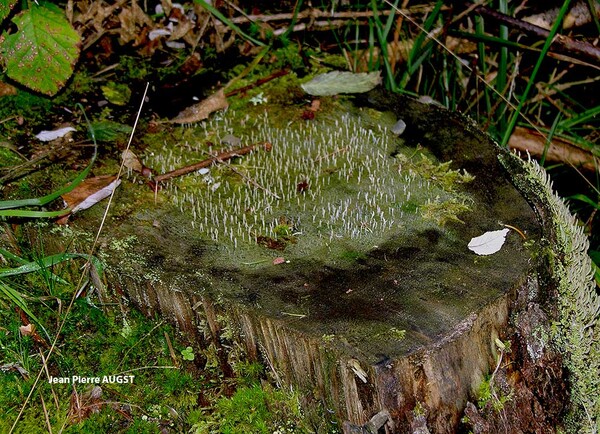
Jean Pierre Augst - Source: hhttp://www.lichensmaritimes.org/index.php?task=fiche&lichen=648&lang=en
France, Auvergne
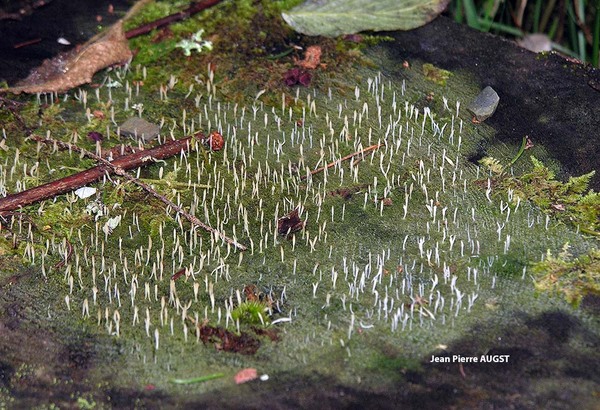
Jean Pierre Augst - Source: hhttp://www.lichensmaritimes.org/index.php?task=fiche&lichen=648&lang=en
France, Auvergne
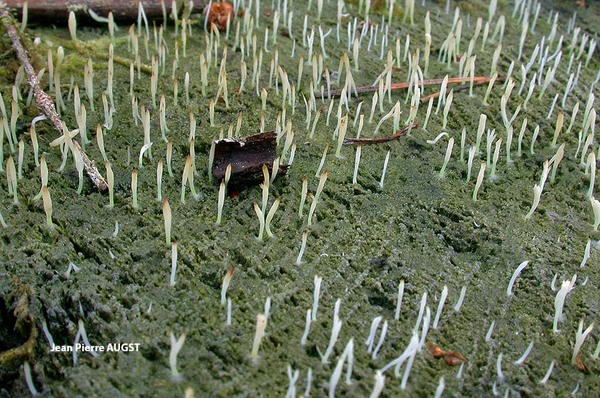
Jean Pierre Augst - Source: hhttp://www.lichensmaritimes.org/index.php?task=fiche&lichen=648&lang=en
France, Auvergne
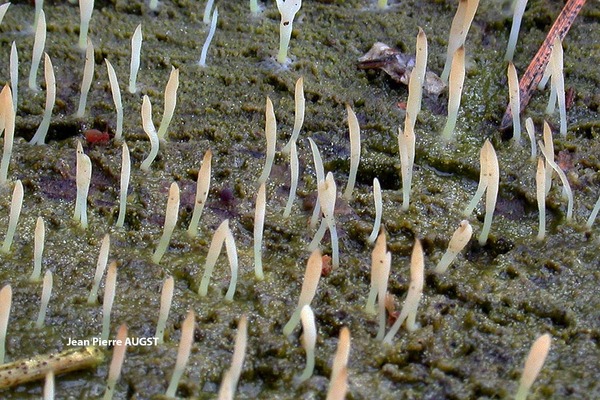
Jean Pierre Augst - Source: hhttp://www.lichensmaritimes.org/index.php?task=fiche&lichen=648&lang=en
France, Auvergne
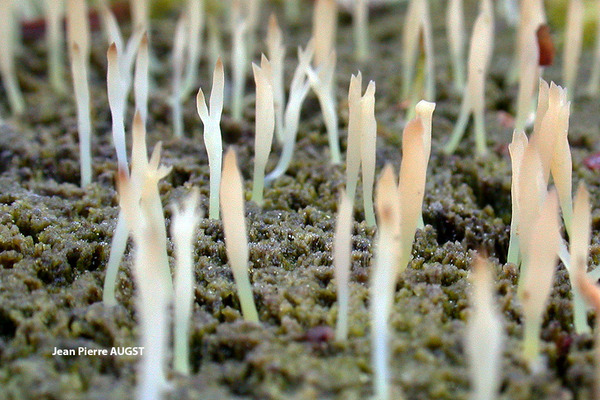
Jean Pierre Augst - Source: hhttp://www.lichensmaritimes.org/index.php?task=fiche&lichen=648&lang=en
France, Auvergne
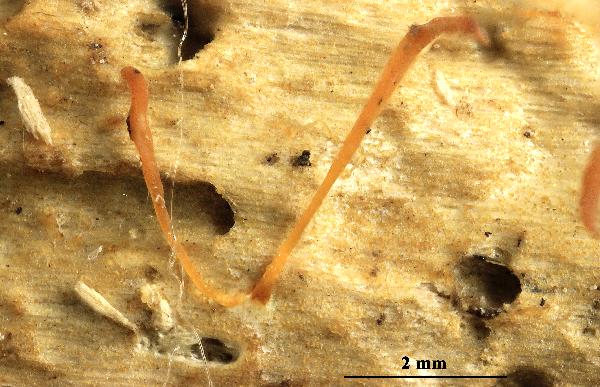

Felix Schumm - CC BY-SA 4.0
[VZR244], Austria. Tirolia septentr.: Montes Alpium, pars Nordtiroler
Kalkalpen, Brandenberg prope Keiserklamm, Krambach, 755 m. Ad
lignum putridum in rivo. Leg. et det. J. Horáková. EX A. VEZDA:
LICHENES RARIORES EXSICCATI NR. 244.
Growth form: Fruticose
Substrata: lignum
Photobiont: green algae other than Trentepohlia
Reproductive strategy: mainly sexual
Commonnes-rarity: (info)
Alpine belt: absent
Subalpine belt: absent
Oromediterranean belt: absent
Montane belt: extremely rare
Submediterranean belt: absent
Padanian area: absent
Humid submediterranean belt: absent
Humid mediterranean belt: absent
Dry mediterranean belt: absent

Predictive model
| Herbarium samples |


P.L. Nimis; Owner: Department of Life Sciences, University of Trieste
Herbarium: TSB (17058)
2003/03/05


Curtis Randall Björk, - CC BY-SA 4.0
Sugarbowl-Grizzly Den Provincial Park, British Columbia, Canada
August 2017
as v. tilesii

Bernard Clesse - Source: hhttp://www.lichensmaritimes.org/index.php?task=fiche&lichen=648&lang=en
France, Storckensohn

Bernard Clesse - Source: hhttp://www.lichensmaritimes.org/index.php?task=fiche&lichen=648&lang=en
France, Storckensohn

Bernard Clesse - Source: hhttp://www.lichensmaritimes.org/index.php?task=fiche&lichen=648&lang=en
France, Storckensohn

Bernard Clesse - Source: hhttp://www.lichensmaritimes.org/index.php?task=fiche&lichen=648&lang=en
France, Storckensohn

Jean Pierre Augst - Source: hhttp://www.lichensmaritimes.org/index.php?task=fiche&lichen=648&lang=en
France, Auvergne

Jean Pierre Augst - Source: hhttp://www.lichensmaritimes.org/index.php?task=fiche&lichen=648&lang=en
France, Auvergne

Jean Pierre Augst - Source: hhttp://www.lichensmaritimes.org/index.php?task=fiche&lichen=648&lang=en
France, Auvergne

Jean Pierre Augst - Source: hhttp://www.lichensmaritimes.org/index.php?task=fiche&lichen=648&lang=en
France, Auvergne

Jean Pierre Augst - Source: hhttp://www.lichensmaritimes.org/index.php?task=fiche&lichen=648&lang=en
France, Auvergne


 INDEX FUNGORUM
INDEX FUNGORUM
 GBIF
GBIF
 DOLICHENS
DOLICHENS
